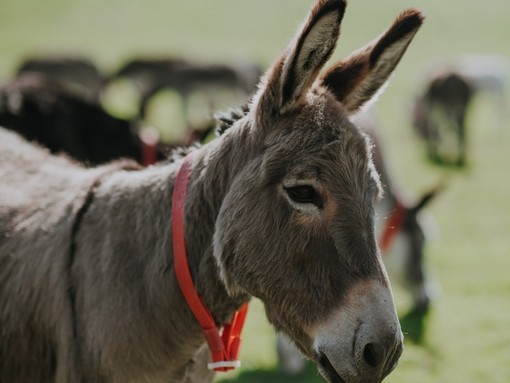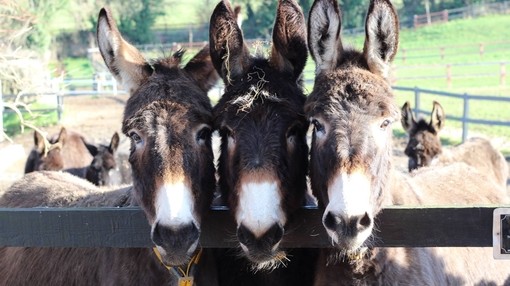
How to understand donkey characteristics
Stubbon as a donkey
A YouGov survey saw 55% of the general public associate donkeys with the “stubborn” label. Learn more about why this reputation is unjustified.
Why does this misunderstanding exist?
This misunderstanding stems from three donkey characteristics:
- A stoic nature with very subtle body language, especially when showing pain or fear
- A natural propensity to freeze when threatened or frightened
- A strong sense of self-preservation.
When these characteristics are combined, it can be easy to misinterpret a donkey’s refusal to complete an activity as stubbornness.
If my donkey is not being stubborn what might it be telling me?
The following may be motivating your donkey’s behaviour:
- Pain
- Fear
- Not understanding the required behaviour
- The behaviour or attitude of the handler.
Remember:
Refrain from labelling your donkey as “stubborn” and analyse for underlying causes that may be hiding under their body language.

Are donkey affectionate?
A YouGov survey found 62% of the general public don’t associate donkeys with being “affectionate”. A donkey’s affectionate nature can take some time to show, so it pays to learn more about this characteristic.
Why does this misunderstanding exist?
One key thing to remember is that donkeys will not start out as naturally affectionate towards humans. They are a prey species with a strong sense of self-preservation so naturally avoid predators, such as humans.
In situations where a donkey has suffered from neglect or abuse at the hands of humans, they may have naturally learned to perceive humans as a threat and will not show their true affectionate nature.
If my donkey is not being affectionate what might it be telling me?
The following may be influencing your donkey’s behaviour:
- Fear
- Negative past experiences
- The behaviour of attitude of the handler.
Remember:
If donkeys have a warm and welcoming home, are handled correctly and experience the kindness of humans from an early age they will reciprocate and show their affection to us.
Donkeys are very good at avoiding people that are bad for them.

How intelligent are donkeys?
When responding to a YouGov survey, 74% of people did not think of donkeys as “intelligent”. There have been centuries old misconceptions surrounding donkey intelligence, learn why these are misplaced.
Why does this misunderstanding exist?
Myths surrounding donkey intelligence are highly influenced by everyday language. Comparisons with donkeys sometimes act as a means of insulting an individual’s intelligence.
The natural instinct of a donkey, which places great emphasis on self-preservation, may mean that it does not do what a person wants it to do. In these circumstances, it is often easier to label the donkey as “stupid” rather than analysing the underlying factors.
The truth about donkey intelligence
Donkeys have an excellent memory, and great ability to learn. A 2013 study by The Donkey Sanctuary found that they can learn and problem-solve at the same pace as dolphins and dogs.
This means that donkeys remember good and bad experiences for a long time. Negative or painful experiences affect the donkey’s behaviour, sometimes for years so being a careful and considerate handler is vital.

Charasmatic creatures
Only 18% of people polled by YouGov believed donkeys to be charismatic. All donkeys possess their own unique charm, helping them make an enormous impact worldwide. Learn more here.
Why does this misunderstanding exist?
Donkeys require positive human company in order for their charismatic nature to shine. Negative experiences with humans will encourage a donkey to avoid people due a combination of their self-preservation instinct and their long-reaching memory. This can then be misinterpreted as shyness or an absence of charisma.
What might negatively impact my donkey’s charisma?
A lack of charisma may indicate some underlying problems such as:
- Discomfort
- Pain
- Fear
- Lack of mental stimulation
- Lack of environmental enrichment
- Negative experiences with people.
Remember:
Donkeys are joyful and enthusiastic, not grumpy or uncharismatic. If you notice a change in your donkey’s personality, make sure to check for any negative environmental factors or underlying health issues.

Cautiously curious
Only 26% of people considered donkeys as curious when polled by YouGov. There are a number of factors that can influence a donkey’s curiosity; learn more here.
Why does this myth exist?
The natural caution of the donkey can be perceived as a lack of curiosity. This can be magnified if the donkey has negative past experiences. The donkey’s sense of self-preservation coupled with its strong memory will ensure it avoids certain situations that may be perceived as dangerous, which can then be misinterpreted as a lack of curiosity.
How can I encourage my donkey’s curiosity?
Donkeys possess a natural, slightly fearful, curiosity. Increasing the living standard of a donkey will help bolster this sense of curiosity If they’re allowed to exist in a naturally loving and kind environment, you’ll find that donkeys naturally begin to investigate things and be more willing to experience new situations.

Share this page
Tags
- Blog

